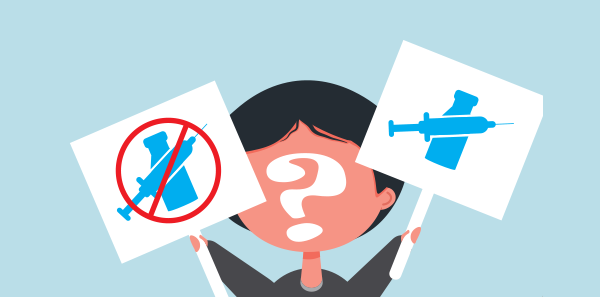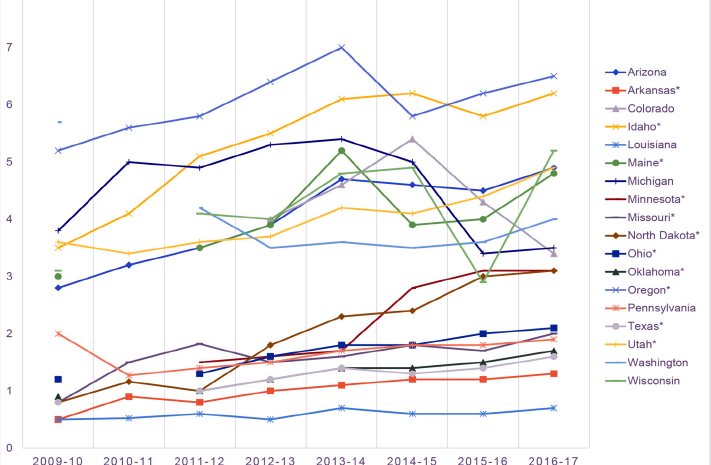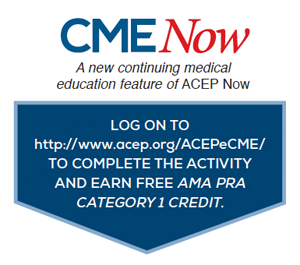
Explore This Issue
ACEP Now: Vol 38 – No 02 – February 2019If we’re the safety net we claim to be, I think emergency physicians should confront the increasing number of parents who refuse to vaccinate their kids based on nonmedical exemptions, even in the face of states increasingly requiring vaccination.1 When I spoke about this at a past ACEP Scientific Assembly, I was surprised there was some resistance to this idea, particularly in light of the measles outbreaks in New York, California, Minnesota, and most recently in Washington state, or the nationwide increase in kindergarten nonmedical exemption rates over the past decade or so. I therefore want to revisit this contentious topic, beginning with a real case.
The Case
A mother brings her 6-month-old child to the emergency department for a high fever and listlessness. The girl has a temperature of 104.9°F and pulse of 199, but she perks up with some IV fluids. Her labs show a normal total white blood cell count and a low bicarb (13). The assessment: viral illness and dehydration. However, the emergency physician orders blood cultures and antibiotics just in case. The mom refuses to allow her child to receive antibiotics because one of the girl’s older siblings reportedly experienced some antibiotic-related side effects.
The child is admitted for observation, during which time she worsens and becomes lethargic. The pediatrician’s note indicated the child was up-to-date on immunizations. Like the emergency physician, the pediatrician wants to start antibiotics, but the mother is adamant. The pediatrician documents the refusal and obtains a signed against-medical-advice form.
A lumbar puncture is performed and shows evidence of bacterial meningitis (ie, her cerebrospinal fluid grew pneumococcus), and the mom then allows antibiotics. She later admits she had actually declined to have her child vaccinated, including with Pneumovax, because she was skeptical of vaccine safety and effectiveness.
The child sustains devastating neurological injuries. The parents sue the emergency physician and pediatrician for malpractice.
When I was an emergency medicine resident in the 1980s, I got interested in infectious disease because I’d regularly see cases of bacterial meningitis in kids. However, since the introduction of the Haemophilus influenzae type B (HiB) vaccine and Pneumovax, the risk of meningitis has decreased by more than 90 percent, and I can’t recall the last time I diagnosed meningitis in a child. These vaccines have even decreased the rate of ear infections. I highlight HiB and pneumococcus because the risk of these infections to individual unvaccinated children is greater than that of largely vaccine-eliminated infections in the general population, such as measles and polio.

(click for larger image) Figure 1: Nonmedical Vaccine Exemption Rates in Kindergarten Students
Increasing nationwide trend in kindergarten nonmedical exemption rates (NMEs out of the total kindergarten enrollments) from 2009–2017. *= states demonstrating upward trend.
Credit: Olive JK, et al. PLoS Med. 2018;15(6):e1002578. (CC BY 4.0)
Countering Anti-Vax Misconceptions
Let’s take on some common misconceptions about immunizations:
“Vaccines cause autism.” Although the onset of autism coincides with the time of childhood vaccinations, not only is there no evidence they are correlated, substantial affirmative evidence exists that dispels this notion. A meta-analysis of 10 studies involving 1.2 million children found no relationship between autism and immunizations, or specifically to mercury and thimerosal-containing vaccines.2 In fact, autism societies, such as Autism Speaks, actively encourage autistic children to get vaccinated. You may also recall the disgraced British doctor Andrew Wakefield, who was found to have published fraudulent research in The Lancet suggesting this association. The article was retracted quite some time after its publication.
“Vaccines cause sudden infant death syndrome (SIDS).” A meta-analysis of nine case-control studies involving 2,065 cases and 6,594 controls found that vaccinated children are actually protected against SIDS, with vaccination reducing the risk by half.3
“Vaccines cause Guillain-Barré syndrome.” Again, a meta-analysis of cases at Kaiser from 1995 to 2005 involving observation of more than 30 million patient years found no association between vaccination and Guillain-Barré syndrome.4 It was estimated that if any risk even existed, it would be on the order of 1 in 1 to 2 million vaccinations, far less common than the risk of a fatal penicillin reaction (1 to 5 in 10,000 patients). Unlike the mother in the above case, many anti-vax parents paradoxically demand antibiotics for their child with a febrile illness even when unnecessary for a presumed viral illness, probably acknowledging on some level the risk they’ve created.
“Vaccines don‘t work.” Although it’s true the efficacy of the seasonal flu vaccine lately has been low, it’s not nothing. Its current efficacy measures around 40 percent, and most seasons it’s higher (roughly 60 percent). In addition, it’s not fully appreciated that vaccinated individuals, if they do contract the flu, experience milder illness than the unvaccinated.
Flu vaccination has also been shown to reduce the risk of: 1) flu-associated pediatric intensive care unit (ICU) admission; 2) cardiac events, hospitalization, and ICU-level care in adults; and 3) hospitalization of pregnant mothers and their newborns. If this is not enough, a 2017 Centers for Disease Control and Prevention (CDC) study showed flu shots decrease the risk of a child dying of flu by about half.5 Considering that as many as 20 percent of the US population gets the flu each year, that’s nothing to sneeze at. You can find educational material from the CDC.
“Most people who get a disease have been vaccinated.” This is true, but it’s a math thing, resulting from the fact that 95 percent of the US population has been vaccinated and that there is a nonresponse rate to vaccines, though it’s rare. For example, if 1,000 people at Disneyland are exposed to a highly contagious measles case from a visitor from the Philippines (as actually occurred in 2014) and there are five unvaccinated kids present, all five will get infected, and so will seven vaccinated kids because the vaccine is only 99 percent effective. Remember, it’s a small world after all, which will only get more dangerous if more and more kids in the United States do not get immunized.
“It’s my right not to vaccinate my child.” Except, by getting vaccinated, you also protect society as well as immune-compromised people who can’t get live vaccines or mount an immune response. The expectation for vaccination is like the taxes that maintain civil protections (such as our military, fire departments, etc.) and car insurance. These individual “sacrifices” are for the common good—and remember, vaccines are safe.
For parents with a libertarian bent, remind them of the libertarian principle that one’s free choice should not impose harm upon others (eg, imposing on someone’s freedom to avoid illness). Individuals should be stopped from participating in the collective imposition of unjust harm, such as vaccine-preventable disease outbreaks.6 Of course, you may neither have the time nor interest in debating libertarian philosophy at the bedside.
Finally, as the above case illustrates, for some infections anti-vaxxers can’t rely on herd immunity derived from the majority who comply to protect their unvaccinated kids.
A Safety Net
So when you take an immunization history and get a “no,” consider it an opportunity for a teaching moment. Ask, “Why?” Let the parent know you’re concerned, too, and that’s why you’ve read up on the actual risks and benefits, which you can explain (and maybe paste a copy of the “Anti-Vaccination Reasons and Responses” table in this article in such patients’ discharge instructions). If you are also a parent, let them know that as well.
Be a safety net and tell these parents why you strongly recommend vaccination.
Dr. Talan is professor of medicine in residence (emeritus) at the David Geffen School of Medicine at University of California, Los Angeles (UCLA) and the chairman emeritus of the department of emergency medicine faculty in the division of infectious diseases at the Olive View–UCLA Medical Center.
References
- Olive JK, Hotez PJ, Damania A, et al. The state of antivaccine movement in the United States: a focused examination of nonmedical exemptions in states and counties. PLoS Med. 2018;15(6):e1002578.
- Taylor LE, Swerdfeger AL, Eslick GD. Vaccines are not associated with autism: an evidence-based meta-analysis of case-control and cohort studies. Vaccine. 2014;32(29):3623-3629.
- Vennemann MM, Höffgen M, Bajanowski T, et al. Do immunisations reduce the risk for SIDS? A meta-analysis. Vaccine. 2007;25(26):4875-4879.
- Baxter R, Bakshi N, Fireman B, et al. Lack of association of Guillain-Barré syndrome with vaccinations. Clin Infect Dis. 2013;57(2):197-204.
- Flannery B, Reynold SB, Blanton L, et al. Influenza vaccine effectiveness against pediatric deaths: 2010–2014. Pediatrics. 2017;139(5):e20164244.
- Brennan J. A libertarian case for mandatory vaccination. J Med Ethics. 2018;44(1):37-43.
Pages: 1 2 3 | Multi-Page







10 Responses to “How Emergency Physicians Can Advocate for Vaccination”
March 10, 2019
Corey SlovisDavid, thank you for this. Greatly appreciate the summary table along with your insights.
Corey Slovis
March 11, 2019
Dave TalanThanks for the shout out, Corey. I hope you are well and taking care of our UCLA grad faculty. Let me know when I can invite myself to come visit your program, never been to Nashville.
March 10, 2019
JeffThis a way more important topic for us to address in the ED than gun control (which we have inappropriately co-opted ACEP to lobby for). Thank you so much for the practical responses to parents unreasonable excuses.
March 10, 2019
Kerry ACEP ForrestalWas the suit successful?
March 11, 2019
Dave TalanI don’t know. I hope not. The plaintiff’s attorney contacted me and I told him that there was no case and that I thought it outrageous that the family would sue the doctors for a problem that they unfortunately imposed through first, deciding to have their child not get vaccinated, second, not being honest about the child’s vaccination history, and third, refusing antibiotics when they were advised.
March 11, 2019
ANN PayneWonderful !
March 12, 2019
Leo Alonso, D.O.DR.Talan,
Thanks for your timely and well researched article. Emotionally this group of parents causes me the most moral and ethical conflict….child abuse being straightforward illegal with criminal judicial societal repercussions…this cohort of parents are afforded a degree of “free speech/thought/religious” protection while the children and the immunocomprimised suffer the consequences of their ignorance. I try to educate them in a non-judgemental fashion but my experience has been a total shutdown…they have made up their mind. I struggle with the effective approach and your article shed some light. I believe only through legislation requiring vaccinations with minimal to no exemptions will the herd immunity numbers be preserved as we enter the digital era where so much misinformation can be circulated with no counter argument.
March 17, 2019
Erin BurnhamThanks for this nice summary David. I agree that we have a duty to encourage our patients to get vaccinated. I have been even more vocal about vaccinations since the EMTs I supervise had a case of tetanus in a child. Tetanus?!
March 28, 2019
Jack SpringerDave,
Thanks for your articulate summary.
I have found the issue of trying to educate parents to change their perspective on vaccination is like having a political or religious conversation with someone of the opposite “belief”. Mostly unshakeable. Even in the face of an argument that childhood vaccinations are likely the greatest ongoing scientific experiment in history, with an N in the billions, and that they are safer than driving the family car to the ER!
April 10, 2019
Michael Herron.I thought for sure the story was going to take a turn…… we called the department of family and children services, they contacted a judge who issued a restraining order and temporary custody to the state. Child was then given IV antibiotics to treat H.flu, then suddenly developed anaphylactic shock..and died….